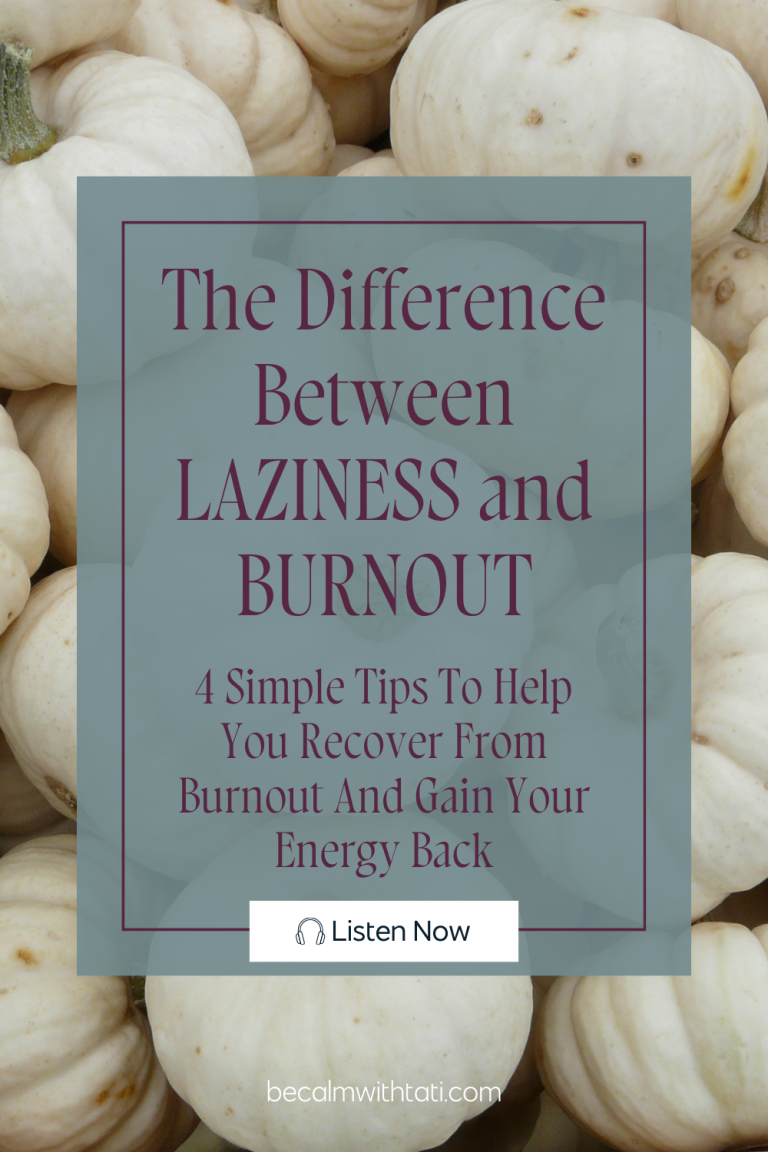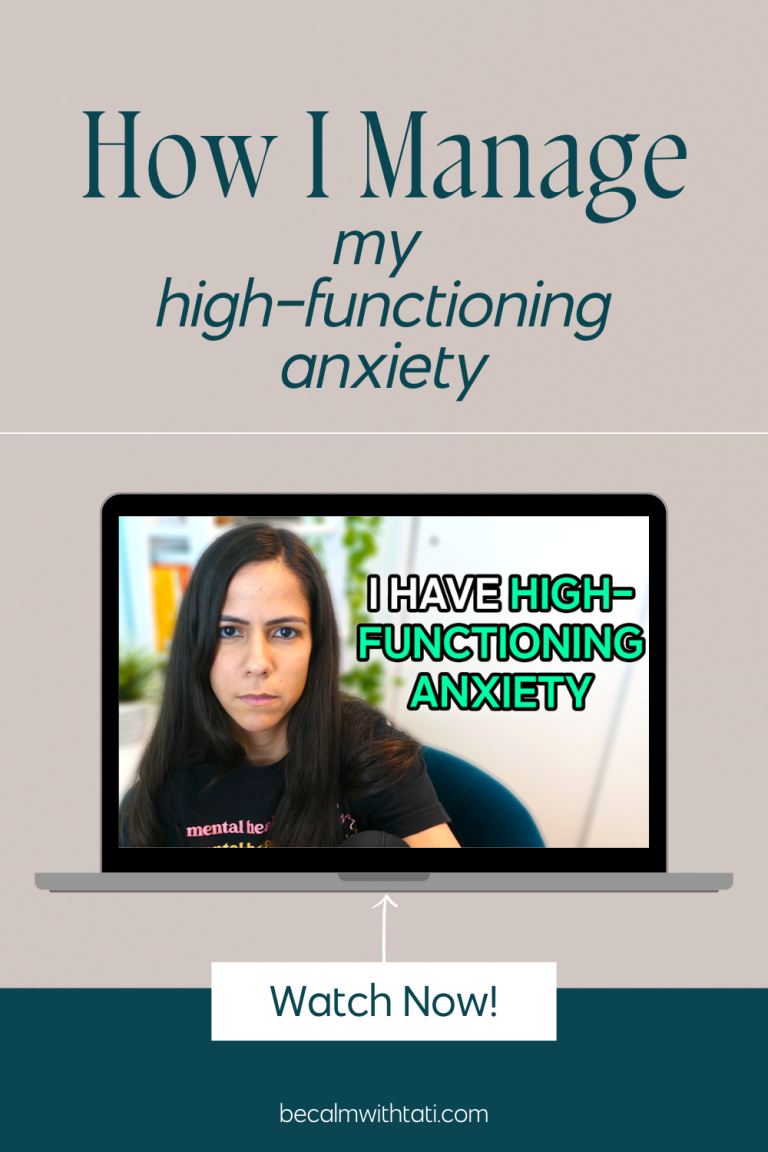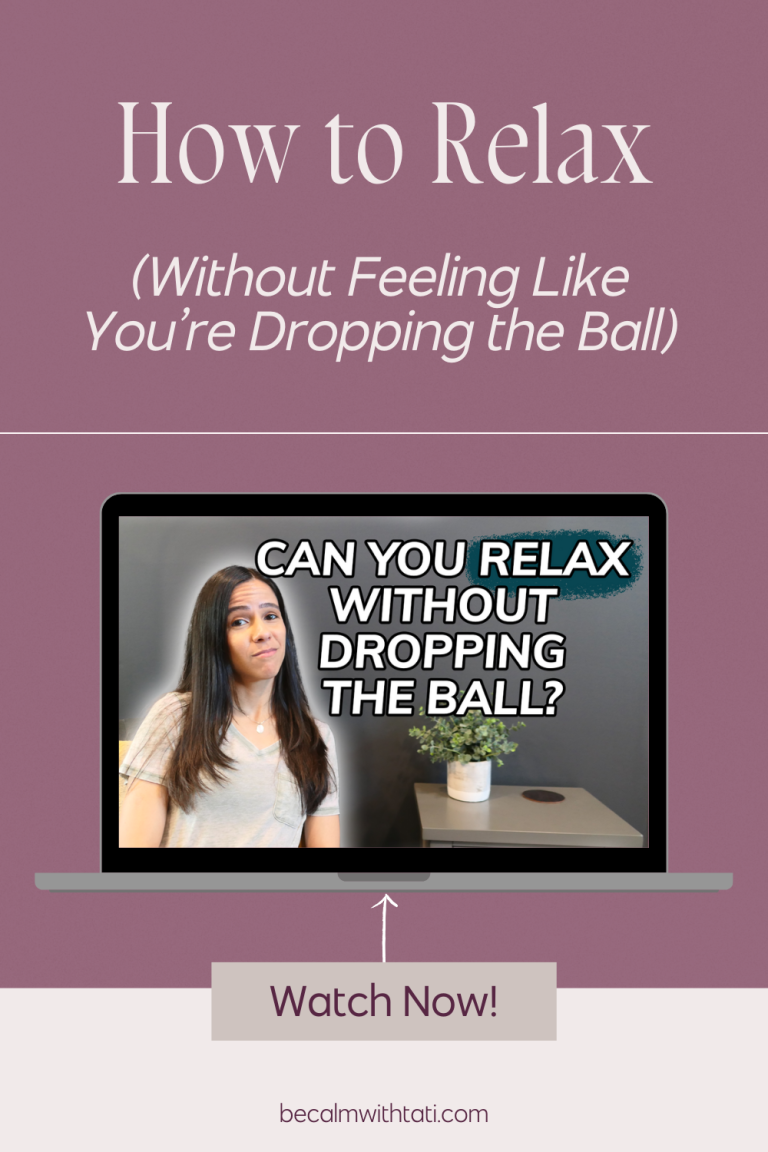We all know how important sleep is to help us function better in our daily lives: to have improved focus, energy, and motivation. But did you know that sleep is also incredibly important for your mental health? Sleep deprivation is associated with an increase in anxiety and depressive symptoms, including an increase in expecting the worst-case scenario. Our culture is massively sleep-deprived and sleep deprivation is often seen as a badge of honor. But the consequences are just not worth continuing to deprive yourself of this essential human need. If you struggle with falling asleep or staying asleep due to anxiety and overthinking, then this episode is perfect for you. In it, we’ll explore practical and simple shifts you can make to get deeper, more restorative sleep so you can function at your best.
In this episode, you will learn:
- The massive mental health benefits of sleep
- Simple daytime tips to help improve your sleep at night
- How to create a calming evening routine so you can get deeper, more restorative sleep
Sources:
https://www.ncbi.nlm.nih.gov/pmc/articles/PMC1739867/pdf/v057p00649.pdf
http://psycnet.apa.org/doiLanding?doi=10.1037%2Fa0020138
https://adaa.org/understanding-anxiety/related-illnesses/sleep-disorders
LISTEN NOW:
🎧 CLICK HERE TO LISTEN TO CALMLY COPING WHEREVER YOU LISTEN TO PODCASTS
WATCH NOW:
GET MOONBIRD: https://calmlycoping.com/moonbird* Coupon code for $10 off: TATIGARCIA
FREE TRAINING: How to Create Work-Life Balance and Feel Calmer From Within
If you want to learn how to take back control of your life so you can feel calmer and more confident, and learn the tools to spend your time according to what matters most to you (no matter what your schedule is like right now)…
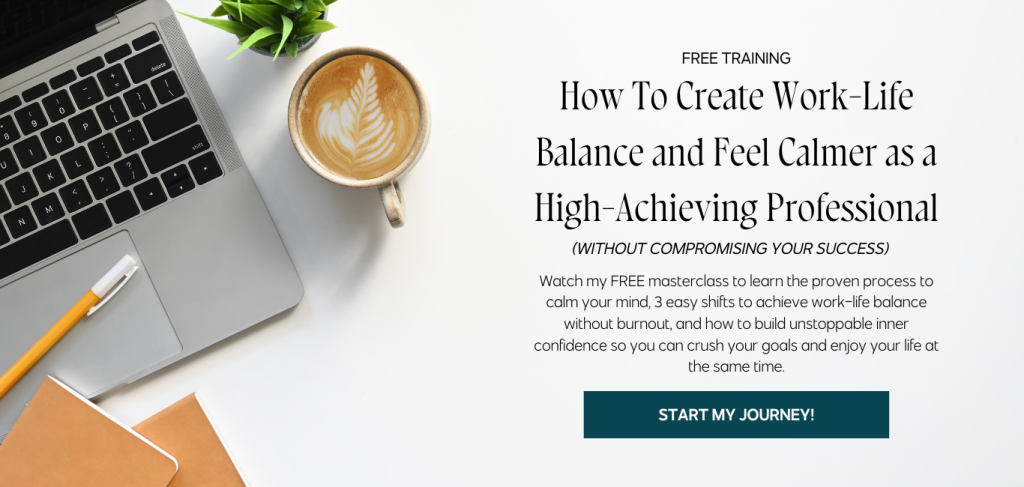
LISTEN, REVIEW, AND SUBSCRIBE TO THE PODCAST!
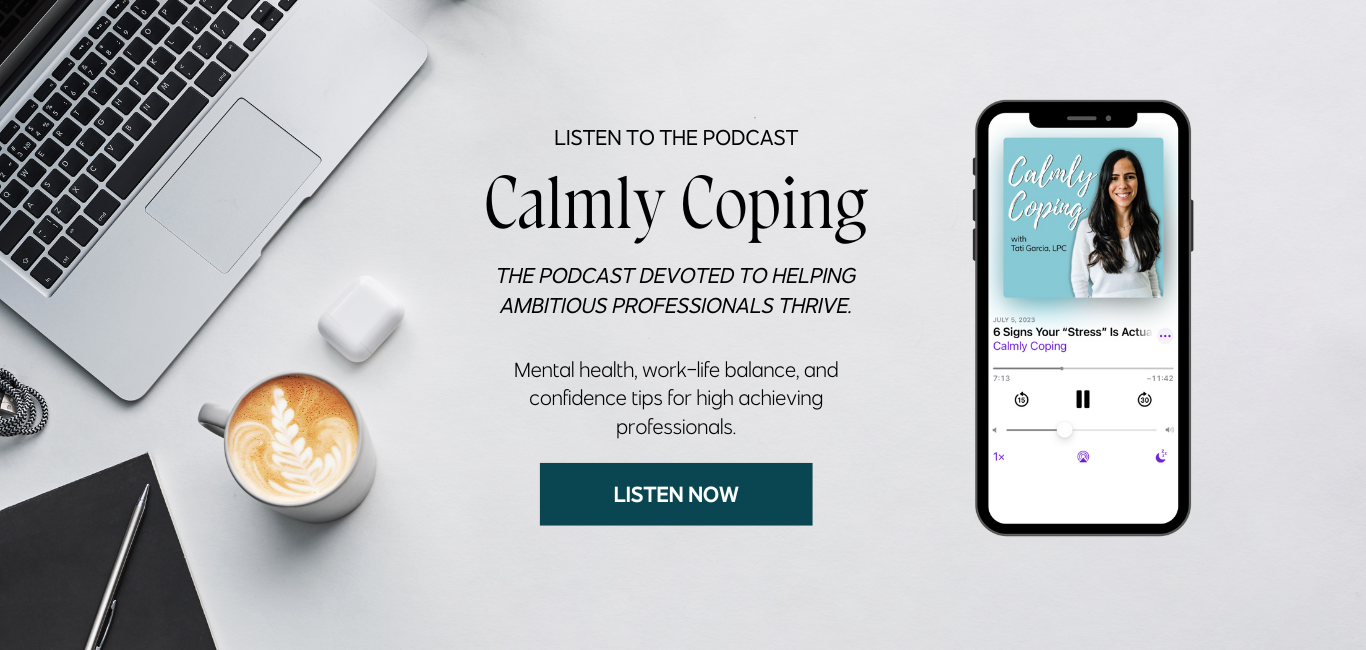
INTRO/OUTRO MUSIC: Rescue Me (Instrumental) by Aussens@iter (c) copyright 2018 Licensed under a Creative Commons Attribution (3.0) license. http://dig.ccmixter.org/files/tobias_weber/57990 Ft: Copperhead
DISCLAIMER: All content here is for informational purposes only. This content does not replace the professional judgment of your own mental health provider. Please consult a licensed mental health professional for all individual questions and issues.
Interested in diving deeper to get support for high-functioning anxiety?
I offer 1:1 coaching to help high-achievers overcoming high-functioning anxiety so they can feel calmer, more present, and have improved balance in their lives. Click here if you’re interested in learning more and getting started.
Calm, Balanced, & Confident is my comprehensive A→Z self-paced course to help high-achieving professionals overcome high-functioning anxiety so they can feel calmer, balanced, and more confident without the anxiety and overwhelm. Click here to learn more and enroll today.
Looking for ongoing support and guidance with high-functioning anxiety? The Calm & Ambitious Community is the exclusive community for high achievers with high-functioning anxiety. Click here to learn more and join us today!
TRANSCRIPT:
Click to view the episode transcript.
We all know how important sleep is to help us function better in our lives, to have improved energy, focus, and motivation. But did you know that sleep is also incredibly important for your mental health? Sleep deprivation is associated with an increase in anxiety and depressive symptoms, including an increase in expecting the worst case scenario.
Our culture is massively sleep deprived and sleep deprivation is often seen as a badge of honor, but the consequences are just not worth continuing to deprive yourself of this essential human need. If you struggle with falling asleep, or staying asleep due to anxiety and overthinking, then this episode is perfect for you. In it we’ll explore practical and simple shifts to help you get deeper, more restorative sleep. So you can function at your best.
Welcome to calmly coping. My name is Tati Garcia and I’m a licensed therapist and coach specializing in high functioning anxiety. I help high achievers stop putting themselves last so they can feel more calm, balanced and confident from within. If this topic interests you, then please like subscribe and hit the notification bell so you will be notified every time I release a new episode. Thank you so much for tuning in.
Speaking of the benefits of sleep. So I previously did this episode a few days ago. I recorded this episode a few days ago and I had a lot of trouble getting through that intro. Whereas now, after I’ve had a few nights of sleep, but I think, you know, my brain has had time to process it.
It was so much easier for me to get through it and that sidebar can be one of the benefits because I had to re record this episode because the original file was corrupt. So there is study after study demonstrating the link between a lack of sleep and mental health struggles. Including both anxiety and depression, especially with anxiety, like I mentioned in the introduction when it comes to the catastrophizing type of thinking or assuming the worst case scenario, I’m sure you’ve experienced those moments in the middle of the night where it’s 3 a.m. and your brain is just going to the worst possible outcomes and you have these strong feelings of dread and you’re just thinking of the what ifs and I know I’ve certainly been there that can really be you. distressing and it can also have a negative impact on the way that you feel during the following day.
And there are some pretty significant statistics that show that a lack of sleep can have an influence on your daily functioning, your mood, and your life satisfaction. So what are the benefits of sleep? Sleep is so incredibly important for your overall wellness, not just for having more energy, but it can also help to reduce stress, reduce inflammation in your body, and improve memory.
Actually, studies found that when students were taking an exam and they had to sleep after they studied and prepared, they did better than if they just studied first and took the exam directly after. Sleep allows your brain to consolidate memories, to take things from short term memory to long term memory.
And during REM sleep is the time period where your brain is processing and working through emotions, especially through dreams. If you’ve ever experienced dreams that had a lot of emotional salience and were really Strong and vivid for you, and you had strong emotions, whether it was anger, sadness, fear, whatever.
This is a way of your brain processing through the emotions that are unconscious under the surface, and this can allow you to better cope with stress and work through these struggles in your day to day life. Sleep also helps to regulate your hormones, which have a big impact on everything in your life, essentially, including hormones for regulating your appetite.
And sleep is also a time when your body repairs itself from the stressors and potential harms from the day. So therefore, it’s a highly important way of regenerating and recuperating. And I think sometimes you can fall into two different camps. So sometimes there are the people who, and obviously this is an overgeneralization, but sometimes there are the people who don’t see the importance of sleep and maybe feel like they don’t have enough time for themselves, and so they stay up late as a result and end up not getting enough sleep.
It’s actually a phrase for this called revenge bedtime procrastination, where you kind of delay going to sleep because you feel like you haven’t had time for yourself during the day. And even though you know you should get to bed earlier, you stay up late watching TV or doing things that you enjoy to have that time for yourself.
And then there’s also the people who, and these could fall into the same category. There’s the people who have trouble falling asleep or staying asleep. So they know that they have to get to sleep and get a certain amount of Sleep, but it’s just something that is elusive and it’s hard for them to get to sleep.
And these tips can apply for both kinds of people. You know, I think that if you’re in the former camp, it can also help to find ways to even take small pockets of time for yourself during the day so that you’re not having to eat into your evening time to. Take that time away from the valuable thing that sleep is because ultimately not getting enough sleep isn’t just going to negatively impact you, but it’s also going to negatively impact the people around you when you are more stressed and you are more frustrated, then you’re going to be more likely to take it out on those close to you.
And so that’s why having and getting enough sleep is going to be beneficial for you, for your relationships and also for your work, because when you’re better able to focus. then you’re better able to get efficient work done. And if you’re in the place of struggling with taking out your frustrations and your stress on your loved ones, I actually have an episode that’s going to be coming out in two weeks on Valentine’s day.
I believe it’s, you know, I think February 14th is the release date cause I think that falls on a Wednesday where I will be talking about that exact topic. So how to stop taking out your stress on your loved ones. So subscribe, follow the podcast if you want to be notified when that episode comes out. So I want to divide this into two separate categories.
So first we’re going to talk about things that you can do to prepare for sleep during the day. And then we’re going to talk about things that you can do to prepare for and get more restful sleep and fall asleep. at night. So it might seem like sleep is something that you just want to focus on at night, but there is research that demonstrates that things that you do during the day can actually help you to get more restful sleep during the night.
So those things include getting sunlight early in the day. And this is because that’s communicating to your brain that it is daytime. So that is communicating to your brain that it is daytime. It is time to be active. It is time to be alert. And so when you are cueing your brain. into that, then it’s going to make it so that once the day wears on and night comes, your brain is going to know, okay, it’s time to start winding down.
And it’s going to communicate this to your body by starting to make more melatonin, which is that, which is that chemical that allows you to start to fall asleep. So this can look like. you know, going outside for a morning walk. It can look like sitting outside in a backyard or a balcony or something, drinking your cup of coffee or tea.
Obviously in the winter time, it’s going to be more challenging, but even if you can look out the window and you know, make sure that you’re opening your curtains and getting that sunlight in, that’s going to be helpful for you. Obviously there’s going to be days where it’s cloudy and you’re not able to do that, but just work with what your environment allows you to.
Another thing that can help you to get restful sleep. sleep is exercising earlier in the day. And for everybody, I know it’s going to be different. So even if you can’t exercise in the morning or during the daytime, as long as you avoid exercising at least two hours before bedtime so that you’re not revving up your body and your energy right before going to sleep.
sleep. But this exercise is of course going to tire you out and it’s going to allow you to get more of that restful sleep later in the day. This is also going to help with anxiety. So studies show that exercise is just as effective as antidepressants. The name aside, antidepressants are not just used in the treatment of depression, but they’re also used in the treatment of anxiety.
And so exercise can be a really valuable tool to help you to get more restful sleep but also to help you to combat anxiety. Another thing I suggest is if you enjoy drinking caffeine to stop drinking caffeine after a certain time. So you can certainly still continue to enjoy your drinks but just get decaf or have herbal tea or something that is not going to give you that caffeine because of course as we know caffeine helps you to be more alert and it does this by blocking the receptors in your brain.
You’re tricking your brain into thinking that you’re more alert and so if we can stop the caffeine because it does take some time to work its way out of your system that’s going to allow you to fall asleep and stay asleep. Another effective practice that I recommend during the day is meditation. And this can be anywhere from even two to five minutes if you don’t have time.
This is just training that muscle of being more present. If you’re able to meditate consistently, this will allow you to be more present during your day. And as a result, allow you to recognize those anxious or worrisome thoughts that are coming up at night and be able to notice them and not. latch on to them or follow them into that downward spiral, but let them go.
So this outcome from meditation, it’s not going to be immediate. It’s like going to the gym. It takes time and consistency to notice these differences. However, you can get benefits in your sleep as a result of this practice. So now let’s work our way into the evening routine. So I recommend having some sort of evening routine because this is communicating to your brain and to your body.
It’s time to start winding down. It’s time to start going to sleep. It’s time to start slowing things down. And it’s obviously going to be preferable if you have a consistent routine where you are going to sleep and waking up at the same time every day. And as much as you can try to do that, I know there’s people who might have shift jobs where you’re working different hours. And so just doing what works best within your schedule and your routine to try and be consistent. Oftentimes what can happen is you are waking up early during the week and then sleeping in during the weekend. And really what that can do is it can really throw off your sleep cycle and your internal rhythms.
And so as much as possible, try and stick to a more consistent schedule. Obviously, it’s not always possible. We have different responsibilities. You may have young children that are waking you up at night or other things. And so do what works best for you. So one thing that is highly recommended across the board, you’ve probably heard this before, is stopping screen time at least 30 minutes to an hour before bed.
And that is because your screens, whether it is is your phone, your tablet, your computer emits what is called blue light, and that is actually stopping your brain from producing melatonin, that chemical I spoke about earlier, that allows your brain to start to wind down for sleep. So if you can especially focus on these devices that are closer to your face, so like I mentioned, the phone, the tablet, the laptop, and disconnect from them and, you know, stop with the scrolling through social media through TikTok or Instagram or stop with the checking email and that’s going to be a two in one benefit because not only are you not getting exposure to that blue light but you’re also not getting exposure to things that could be potentially emotionally triggering. So let’s say if there are things you’re seeing in your email that are causing you to feel stressed out that’s going to activate your body’s stress response and make it more difficult for you to wind down at night.
So it’s not just the internal thoughts that are making it harder to wind sleep, but it could be things that are potentially externally triggering you. So this could be, you know, social media, if you’re seeing some stressful news that’s showing up, or if you’re starting to overthink things in a relationship that you see by something that somebody posted or whatever could be triggering those emotions.
So Um, I recommend trying to do things that are going to be relaxing and intentional and not something that is going to be triggering for you, whether it’s in a positive or a negative way, because even those pleasant emotions of excitement or, you know, I want to get things done can make it harder to wind down at night.
And so this can look like reading a book. It can look like doing a puzzle. It can look like coloring. It can look like drinking a cup of herbal tea. It can look like journaling, meditating, doing calming yoga. So when I say calming yoga, these are practices that are going to help you to slow down and get in touch with your body.
So some examples are yin yoga and I think yoga nidra. Yoga nidra also is a form of meditation, but it’s very effective for helping you to get to sleep at night. You can also take a bath or a shower, do your skincare routine, anything that helps you to wind down from the day. I also recommend not having your phone next to your bed because this just makes it more likely that you’re going to reach for your phone and then get sucked in to potentially triggering things or just have more difficulty winding down.
And if you use your phone as an alarm clock, which I know a lot of people do, then what you can do is actually buy a separate alarm clock. You don’t have to invest a lot of money. I think you can probably find an alarm clock for like 15 bucks online. In my opinion, this is a great. investment that I personally made because it has allowed me to take my phone away from the nightstand and Have it either in the next room or on the other side of the room so that I’m not tempted to use my phone in Bed and then get sucked into that wormhole of addictive behavior There are some specific practices that can be really helpful for allowing your body and mind to wind down at night while you’re in a bed.
And this can include taking slow, deep breaths and just continuing to focus on breathing in deeply into your stomach and then exhaling completely, making the exhale longer than the inhale. And you can focus on relaxing your body. All the muscles in your body, allowing your body to kind of sink into the bed beneath you.
Any of these exercises that are going to bring you awareness with your body and that connection with your body is going to allow you to get out of your head and out of thinking and into that more relaxed state. If you notice your shoulders are tensed up or you know, certain areas of your body are tensed, you’re clenching your jaw as much as you can try and relax.
those areas of your body while you’re in bed. And I like to recommend doing things like deep breathing and meditation, but sometimes that interacts with having a phone. Sometimes people use their phone as a good tool to do guided meditations or to do deep breathing. And so that’s why I was super excited when I learned about this tool that you can actually use to help you to take deep breaths without your phone. And it’s something that I have been using for the past few months. This episode is by no means sponsored. However, I am an affiliate for this product and I only recommend things that I genuinely use and would recommend to my clients, friends, and family. And so this tool is called a Moonbird.
So it looks like this. So basically it is this object, I guess you would call it, that once you wake it up and you can wake it up by shaking it and placing your finger on the sensor here, it also measures your heart rate to give you feedback to see how relaxed your body is and the app actually educates you on all those things.
But you can use it without the app and without a device. And that’s really what I love about it because it is such a great tool for helping you to fall asleep. I’ve personally used it to fall asleep. I’ve personally used it when I’ve woken up in the middle of the night and haven’t been able to get back to sleep.
And basically what it does is it expands in your hand and then contracts to the rhythm of your breathing and to the rhythm of what. breathing pattern you want to take with it. So you can choose a default within the app. So then you can choose, okay, I want a more slow breathing to get to sleep or, or different kinds, depending on what you’re doing.
But like I said, this is something that I have been personally using for a while. I keep it on my nightstand because it’s basically something that’s super helpful to fall asleep and get to sleep because of the fact that it helps your body get into this relaxed state. And it’s actually scientifically proven and Moon Bird users report feeling instant relief. So 81% of Moon Bird users report feeling more refreshed during the day and 78% experience a better sleep quality. If you’re interested in learning more about Moon Bird and getting it, you can go to http://calmlycoping.com/moonbird. You can also click on the link in the description or the show notes, depending on where you’re tuning in.
And I also have a $10 off code for you if you use the code. Tati Garcia, that’s T-A-T-I-G-A-R. C I A. So again, Moonbird can be a really effective tool to help you to relax and calm your mind and body. And regardless of whether you choose to use that tool or not, just any practice, it’s going to get you into your body and out of your mind is going to be something that’s going to help you to fall asleep.
So focusing on doing things that help you to feel more calm and relaxed. And in addition, there can be helpful mindset shifts that you utilize when you’re in bed. Either in the process of falling asleep, or if you’ve woken up and you’re having trouble falling asleep, because it can be really frustrating to be in the place of, okay, I know I need to get to sleep, but my body isn’t falling asleep.
I can’t stop overthinking things. My mind is going to the worst place. What do I do now? I’m really frustrated. I’m really stressed. I’m anxious. What if I’m not going to wake up in time? What if I’m not going to get enough sleep? Whatever is coming up for you. These types of thoughts are going to do the opposite of what you want.
They’re actually going to create more anxiety, more stress, and make it harder for your body to fall asleep. And so what can help is not to judge yourself for having these thoughts, not to try and push them away, but just notice them and then see if you can replace those thoughts with thoughts such as my body knows how to relax.
My body will fall asleep. When it feels ready to and even these small statements and reminders can help to put you more at ease and help you to let go. So the process of letting go can be really effective for helping you to fall asleep because that’s essentially what falling asleep is. It’s the practice of letting go.
Letting go and allowing your body to fall into this restful state. So if you notice anxious thoughts coming up, that’s why that meditation practice can be helpful because it’s the practice of noticing thoughts and then allowing them to let go and not feeding into them, not. continuing to worry about them.
And this is an ongoing practice. So if you’re having trouble with it the first night, that’s okay. Just do your best and remind yourself that you don’t need to get frustrated. You don’t need to get annoyed. You can just focus on the fact that your body knows how to relax. Another helpful tool can be journaling before bed at night and.
Or, if you wake up in the middle of the night and you have a lot of anxious thoughts, getting them out, writing them down. So this is kind of like doing a brain dump of what are the things that are worrying you? What are the things that are stressing you out right now? So you can have an outlet and then basically communicate to yourself, I’m getting this out now.
I’m going to let this go for the rest of the night and then return to these things if needed in the morning or at a time when I can fully address them. So it’s a process of getting out what’s on your mind. So you can, in a way. process it and face it, but then leave it in your journal, leave it on your nightstand, leave it wherever, and then return to it when needed.
So these are my tips for helping you to fall asleep at night. Again, if you’re interested in checking out the Moonbird, then you can go to calmly coping. com slash Moonbird and use the code Tati Garcia for 10 off. If you use this link and this code, then it will help to support this podcast. I’d love to hear your thoughts on this topic.
What helps you to fall asleep at night? So you can leave me a comment if you’re watching on YouTube or you can leave a comment, answer kind of the Q& A if you’re listening on Spotify, and this can help other people to see your tips for getting to sleep at night. And while you wait for next week’s episode, I have other episodes about calming your mind, creating work life balance, and feeling more confident from within, so be sure to check out these episodes here.
Thank you so much for tuning in today, and until next time, be calm.
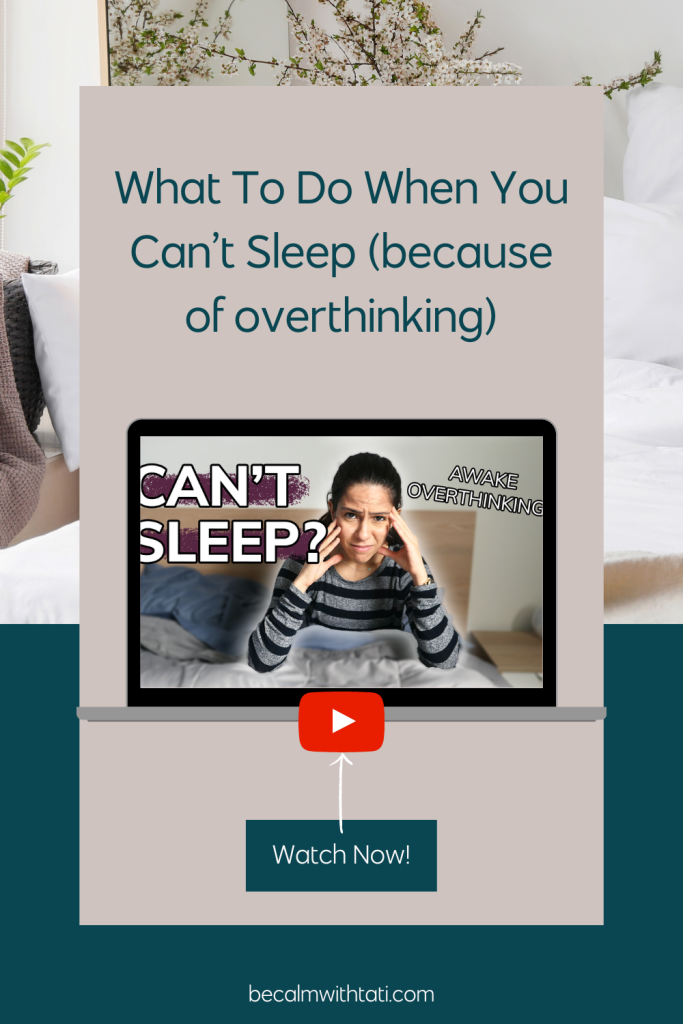
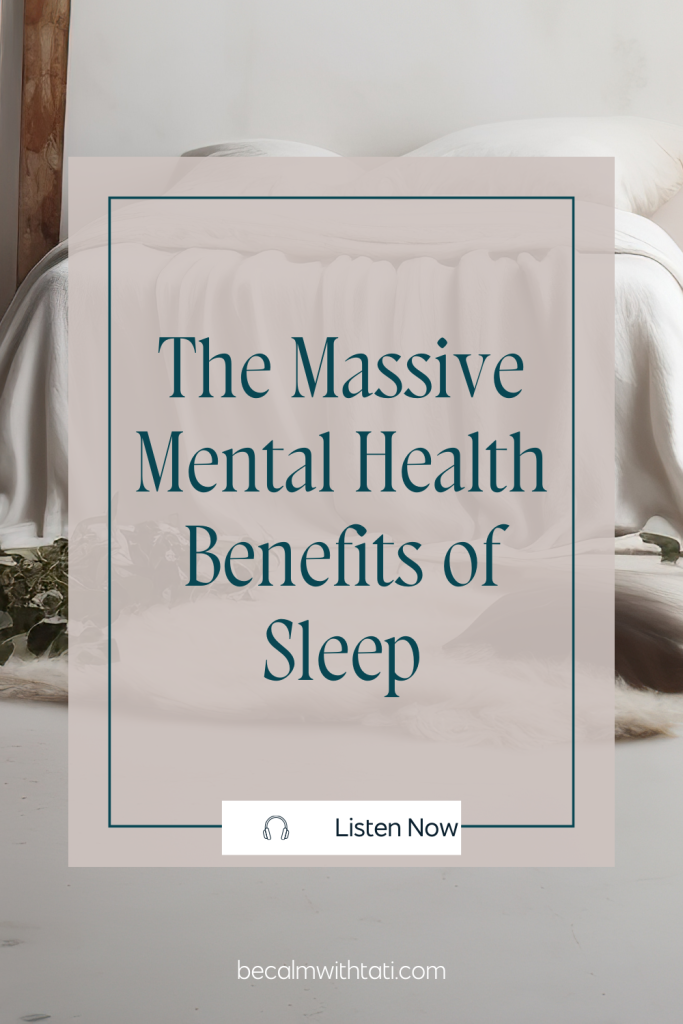
Until next time…




